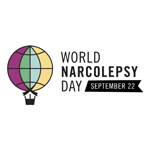World Narcolepsy Day Date in the current year: September 22, 2026
 World Narcolepsy Day is observed annually on September 22 to raise awareness of a chronic sleep disorder that severely affects the quality of life and increases the risk of dangerous accidents such as falls and motor vehicle collisions.
World Narcolepsy Day is observed annually on September 22 to raise awareness of a chronic sleep disorder that severely affects the quality of life and increases the risk of dangerous accidents such as falls and motor vehicle collisions.Narcolepsy is a neurological disorder that affects the body’s ability to regulate sleep-wake cycles. Its common symptoms include excessive daytime sleepiness, brief involuntary sleep episodes, and cataplexy (sudden episodes of muscle weakness). Cataplexy occurs in about 70% of all narcolepsy patients. Narcolepsy with cataplexy is referred to as type I narcolepsy, and narcolepsy without it is type II narcolepsy. Less common symptoms include sleep paralysis and vivid hallucinations.
The exact cause of narcolepsy is unknown. Type I narcolepsy is believed to be an autoimmune disorder. In some cases, which are quite rare, narcolepsy is caused by injuries or diseases that affect the parts of the brain responsible for regulating REM sleep or wakefulness.
Due to its symptoms being non-specific, narcolepsy may be confused with other diseases including sleep apnea and other sleep disorders, anemia, depression, or heart failure. Episodes of cataplexy may be mistaken for seizures. Narcolepsy is usually diagnosed by eliminating other potential diagnoses on the basis of sleep studies.
Narcolepsy cannot be cured, but it can be managed. Narcolepsy management includes lifestyle changes and medications. Behavioral changes that usually help people with narcolepsy to improve their quality of life include sleep hygiene and planned regular short naps (which are not a replacement for nighttime sleep).
Medications used to help patients with narcolepsy include central nervous system stimulants such as amphetamine, armodafinil (Nuvigil), dextroamphetamine, methylphenidate (Ritalin, Concerta) and modafinil (Provigil), norepinephrine reuptake inhibitors, sodium oxybate, and medications that suppress REM sleep (selective serotonin reuptake inhibitors, tricyclic antidepressants).
World Narcolepsy Day was established in 2019 by twenty-four patient advocacy organizations from around the globe that came together to unite the international narcolepsy community, raise narcolepsy awareness among the general public, reduce stigma surrounding the diagnosis, and support millions of narcolepsy patients worldwide.
You can observe World Narcolepsy Day by educating yourself about the disorder, participating in one of the many World Narcolepsy Day events held by patient advocacy organizations around the globe or even organizing an event of your own, donating to an organization that funds narcolepsy research, and spreading awareness on social media using the hashtag #WorldNarcolepsyDay.
If you’re living with narcolepsy, consider sharing your story online to let recently diagnosed patients know that the disease is manageable (but you don’t have to if you’re not comfortable with it). If you’ve been experiencing excessive daytime sleepiness, World Narcolepsy Day is your cue to get evaluated by a neurologist.
- Category
- International Observances
- Tags
- World Narcolepsy Day, international observances, awareness days, narcolepsy, neurological disorders